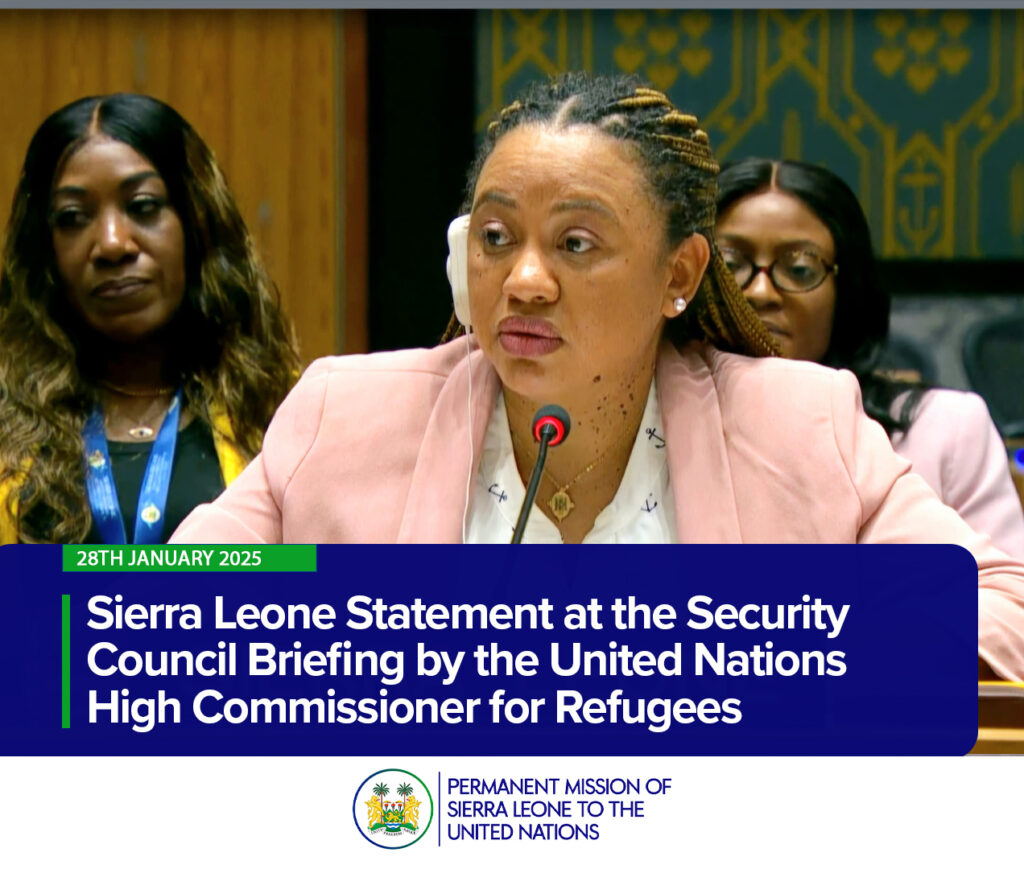STATEMENT BY
H.E. MS. MICHAELA E. B. SWALLOW
Ambassador and Deputy Permanent Representative /
Chargé d’Affaires a.i.
Thank you, Mr. President.
I also thank Mr. Filippo Grandi, United Nations High Commissioner for Refugees, for his comprehensive briefing and valuable insights.
Sierra Leone is deeply alarmed by the escalating global crisis of displacement, affecting refugees, asylum seekers, and stateless persons. The urgency of this situation cannot be overstated. Millions are being forcibly uprooted by persecution, armed conflict, violence, human rights violations, climate-related disasters, and other catastrophic events. By June of last year, the global number of forcibly displaced persons had reached a staggering 122.6 million, including 72.1 million internally displaced persons (IDPs).
This surge reflects the increasing number of conflicts worldwide. Africa, in particular, bears a disproportionate burden, hosting over one-third of the world’s forcibly displaced persons, including nearly 22 million IDPs. The crisis is particularly severe in Sudan and the Democratic Republic of Congo, where intensified conflict and targeted attacks on densely populated areas have driven significant displacement.
In view of the disturbing trends and growing challenges facing displaced populations, Sierra Leone wishes to highlight three key points:
First, we urge the Security Council to ensure the protection of displaced civilians in accordance with international human rights and humanitarian law. Despite existing legal frameworks and the Council’s calls, notably through Security Council Resolution (SCR) 1265, parties to conflict continue to violate their obligations. We are witnessing relentless and targeted violence in Sudan, DRC, Ukraine, Myanmar, and Haiti, often involving destructive weapons such as drones and ballistic missiles. In Gaza, indiscriminate bombardments, destruction of civilian infrastructure, and attacks on humanitarian personnel remain deeply troubling and are clear violations of international humanitarian law.
Women and girls continue to bear the brunt of armed conflict, displacement, and climate crises. Beyond the loss of agency, livelihoods, education, and basic services, they face escalating levels of sexual and gender-based violence. Harrowing reports have emerged from Sudanese women fleeing to Chad, Congolese women in displacement camps around Goma, and Rohingya women and girls in long-term refugee camps in Bangladesh. Climate-induced disasters further compound their vulnerability and increase the severity of such violence.
Second, humanitarian support for displaced persons must be grounded in a firm commitment to humanitarian principles, alongside efforts to advance sustainable peace and development. The Security Council and the broader UN system must intensify efforts to ensure life-saving assistance reaches those in need, in accordance with SCR 1674. This is especially vital amid declining humanitarian funding and increasing restrictions on aid delivery imposed by belligerents.
In this context, we strongly condemn the growing number of attacks against humanitarian personnel, particularly in Gaza and Sudan, and call for accountability for those responsible. Peace processes must prioritize civilian protection and uphold the core humanitarian principles of humanity, neutrality, impartiality, and independence. The safe, voluntary, and dignified return of refugees to their countries of origin remains critical for long-term peace and stability, including in the Middle East, where over 200,000 Syrian refugees are returning home after years of conflict.
Third, as co-chair of the Security Council’s Informal Group on Women, Peace and Security, and a member of the Board of the Compact on Women, Peace and Security and Humanitarian Action, Sierra Leone commends the UNHCR for its leadership in this Compact. We also acknowledge its partnership with the Women’s Peace and Humanitarian Fund and its collaborations with agencies like WFP and ILO through programs such as SKILL UP in Africa and the Middle East. These initiatives provide displaced persons with access to training, protection, and asylum, deliver life-saving aid, and work to reduce statelessness. We further welcome regional efforts to address statelessness, including the African Union’s adoption of the Protocol to the African Charter on Human and Peoples’ Rights in 2024.
In closing, Mr. President, Sierra Leone reiterates the urgent call for countries and development partners to respond to the critical needs of displaced persons. UNHCR’s global appeal of US$10.2 billion for displaced and stateless populations remains sadly underfunded, with only US$1.5 billion received to date. We hope today’s briefing serves as a catalyst for action, including through compassionate and responsive refugee and asylum policies.
I thank you.



